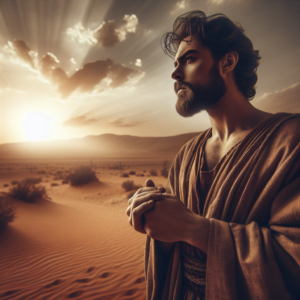Finding Redemption and Grace: Insights From The Godfather
Welcome to an enlightening journey where we traverse the unforgettable narrative of The Godfather (1972), drawing parallels to enriching biblical teachings that illuminate the path of righteousness and grace. This legendary film, with its riveting portrayal of loyalty, power, and redemption, provides us with a unique lens to explore profound spiritual truths.
Power and Humility: Learning From Don Vito Corleone
One of the film’s central figures, Don Vito Corleone, embodies the complex interplay between power and humility, a theme extensively explored in scripture. Despite his formidable presence and authority, Don Vito often exhibits restraint and wisdom, echoing the biblical principle found in Proverbs 15:33, “Wisdom’s instruction is to fear the Lord, and humility comes before honor.”
This character teaches us the value in exercising power with humility, reminding us that the true strength of a leader is not in exercising dominance, but in showcasing forgiveness, empathy, and understanding.
Familial Bonds and Sacrifice: Echoes of Christ’s Love
The themes of familial loyalty and sacrifice are central to The Godfather. The Corleone family navigates trials and tribulations, always emphasizing the importance of unity and protection. This mirrors the sacrificial love Christ demonstrated, as stated in John 15:13, “Greater love has no one than this: to lay down one’s life for one’s friends.”
In the selfless acts of characters like Michael and Sonny Corleone, we witness a reflection of Christ’s ultimate sacrifice, prompting us to ponder the depth of our love and loyalty towards our own families and humanity.
Consequences of Actions: A Call to Righteous Living
The narrative of The Godfather is also a solemn reminder that our actions have consequences, both immediate and eternal. The biblical teaching found in Galatians 6:7, “Do not be deceived: God cannot be mocked. A man reaps what he sows,” can be seen through the challenges and trials faced by the Corleone family due to their choices.
It encourages a reflective look at our own lives, urging us to live righteously and make choices that honor God, ensuring a legacy of blessings rather than repercussions.
Embracing Redemption: The Path of Transformation
The powerful storyline of The Godfather concludes with a sense of redemption and hints at the possibility of transformation. This resonates with the biblical promise of redemption through Christ. As expressed in 1 John 1:9, “If we confess our sins, He is faithful and just and will forgive us our sins and purify us from all unrighteousness.”
This theme invites us to consider our own path, recognizing it’s never too late to turn towards God’s grace and embark on a journey of renewal and redemption.
Engaging with Faith and Film: Bringing It All Together
The Godfather, with its intricate portrayal of family, power, and redemption, serves as a profound backdrop for exploring the depths of biblical teachings and spiritual truth. The characters’ experiences challenge us to reflect on our own choices, emphasizing the importance of humility, sacrifice, and a righteous life. Above all, it underscores the transformative power of forgiveness and redemption, offering hope and encouragement in our spiritual journey.
As we navigate our own narratives, let us draw inspiration from both the timeless wisdom of scripture and the compelling storytelling of The Godfather, embracing the lessons they offer for living a life of faith, grace, and love.
Have the stories of The Godfather inspired you in your faith journey? How do you see biblical principles reflected in your favorite films? Share your reflections and let’s encourage each other to find spiritual wisdom and guidance in all facets of life, including cinema.
If you want to see how ANY movie relates to Biblical principles, please try our Movies and Scripture GPT. Simply key in any movie and let it show you insights you might not have realized otherwise!

